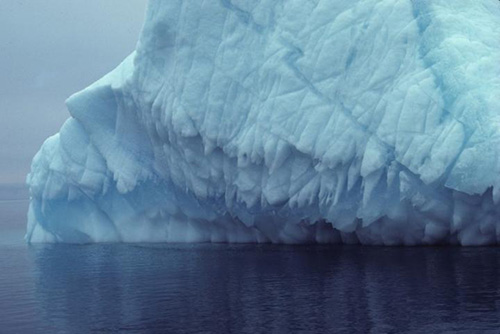
Melting sea ice increases Arctic precipitation, complicates climate predictions
December 27, 2015
"The increases of precipitation and changes in the energy balance may create significant uncertainty in climate predictions," says lead author Ben Kopec, a PhD candidate in Dartmouth's Department of Earth Sciences.
Ben Kopec, a Ph.D. candidate in Dartmouth College's Department of Earth Sciences, and his colleagues find that the melting of sea ice will significantly increase Arctic precipitation, creating a climate feedback comparable to doubling global carbon dioxide.
In their study, the Dartmouth-led team quantified that link by measuring the hydrogen and oxygen isotopic compositions of precipitation from 1990 to 2012 at six sites across the Arctic. They then used these empirically established sensitivities of precipitation isotopes to sea ice change to project future precipitation changes and to evaluate impacts of these changes on the energy balance. Their approach is based on the premise that Arctic precipitation is composed mostly of water from two marine evaporation regions, or "moisture sources" - one subtropical and one local - and that the relative contributions of the two sources to the precipitation can be determined from the stable isotopic ratios of the precipitation. They found that for a sea ice extent decrease of 100,000 km2 - or 38,610 square miles -- the percentage of Arctic sourced moisture increases by 18.2 percent and 10.8 percent, respectively, in the Canadian Arctic and Greenland Sea regions. This corresponds to increases of 10.9 percent and 2.7 percent per degree Celsius of Arctic warming, respectively. The researchers reached no conclusion on whether the increased precipitation will fall as snow or rain. If it falls as snow, it could potentially increase glacial mass and the number of days of high land surface reflectivity, thus having a cooling effect. But if the increased precipitation falls as rain, it would cause earlier spring melt and/or later onset of autumn snow coverage, a longer low reflectivity period and additional warming. In either case, the resulting radiative forcing likely has an order of magnitude similar to that of the forcing from doubling carbon dioxide, thus demonstrating that the sea ice feedback to radiation balance through the Arctic water cycle is potentially a major component of climate change. "Sea ice is declining at an alarming rate, so it is important to understand the consequences of the climate feedbacks caused by these changes," Kopec says. "We show that the loss of sea ice will likely increase precipitation, which will impact communities and ecosystems around the Arctic. The change of precipitation, depending on the seasonal distribution, may impact the energy balance on the same order of magnitude as the feedbacks associated with doubling carbon dioxide." The study was supported by the National Science Foundation for the iisPACS (Isotopic Investigation of Sea ice and Precipitation in the Arctic Climate System) and for Dartmouth's IGERT (Integrative Graduate Education and Research Traineeship) project for Polar Environmental Change. The findings appear in the journal Proceedings of the National Academy of Sciences.
Edited by Mary Kauffman, SitNews
Source of News:
|
||
